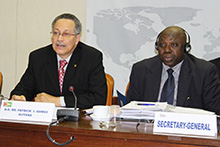New SG eyes wide “scope of promise” for ACP role in international cooperation
 Post-2015 focus to boost South-South & triangular links, build on Group’s development finance & programming know-how
Post-2015 focus to boost South-South & triangular links, build on Group’s development finance & programming know-how
Brussels, 15 December 2014/ ACP: The Secretary General designate of the ACP Group, Ambassador Patrick Gomes, has named key areas to which the 79-member bloc of developing countries hopes to bring an added value, in the effort to help reduce poverty and promote sustainable economic development amongst the ACP’s nearly one billion population.
“The emphasis on intra-ACP trade and investment, industrialisation, regional integration – and particularly to mobilise our cultural resources across the African, Caribbean and Pacific is a great challenge, abut also a great scope of promise,” said Ambassador Gomes in his first press conference after being appointed as head of the Brussels-based ACP Secretariat on 10th December 2014.
With its “tri-continental” reach, the potential for the ACP Group as an organised platform or “hub” for South-South and Triangular cooperation has been recognised. South-South Cooperation (SSC) refers to the exchange resources, knowledge, technology and experience between or amongst developing countries, with the aim of fighting poverty and promoting sustainable development. In Triangular Cooperation (TrC), a third party – usually a developed country – also enters the partnership by sharing its own resources and expertise.
Ambassador Gomes said the aim is to intensify cooperation amongst ACP states and to leverage on the Group’s large membership in consolidating a single voice on development issues of common concern. The ACP Group’s decades-long experience co-managing billions in official development assistance via its partnership with the EU, will also inform concrete contributions to the post-2015 agenda.
“We have had the experience of working with the European Development Fund, the largest contributor to official development assistance (ODA), since the first EDF. We have garnered experience in designing development programmes – looking at outputs, looking at how to have a mid-term assessment, looking at needs analyses, and therefore that programming experience that is now an accumulation of both human and technical capital is to be put at the disposable in making development finance cooperation much more targeted, much more effective,” stated Ambassador Gomes.
He envisions a key role for ACP countries in the forthcoming global conference in financing for development to be held in Addis Ababa in July 2015.
Trade finance, Cultural industries
In terms of promoting industrialisation and intra-ACP trade cooperation, the Secretary General-designate plans to explore the establishment of a “long term development fund”, building on an earlier study commissioned by the ACP Secretariat on the feasibility of an ACP Bank. The fund would have “both a savings and investment component”, he said.
Moreover, he called for more focus on the untapped potential of cultural industries to boost economic development in member countries.
“When people ask us where is a unique contribution we can make, it is certainly drawing on this rich cultural heritage [in the ACP countries]… in terms of all aspects of the arts. We also believe that there is a scope for youth entrepreneurship, for young people who are attracted to being innovative in using the media in business,” he added.
Ambassador Gomes begins his five-year term in office on 1 March 2015. The period includes critical global discussions on the development agenda to follow the Millennium Development Goals in 2015. Talks are also underway on what framework will follow the current ACP-EU partnership agreement which ends in 2020. The current agreement with the European Union allocates an overall amount of EUR 31.5 billion as development finance for African, Caribbean and Pacific countries from 2014-2020.
(Photo: Incoming and outgoing Secretaries-General, H.E Dr Patrick Gomes and H.E Alhaji Muhammad Mumuni)
– ACP Press
